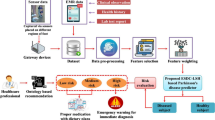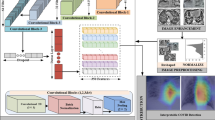Abstract
The unexpected COVID-19 outbreak is currently putting humans around the entire globe in extreme danger. The emergence of this pandemic highlights numerous flaws in the healthcare and medical domain. Hospitals have great difficulty in providing the medical needs of patients during outbreaks, especially when the population grows quickly. It leads to the evolution of the most influential technology, Recommender Systems. Recommender Systems are vital in deciding, especially in determining the COVID-19 patients. We proposed Ensemble boosted classifier for achieving enhanced predictive results through the combination of several models. The proposed mechanism contains a Content-Based Filtering technique with a collaborative filtering system for obtaining suitable recommended results. The proposed system implements three main classes: Bagging, stacking, and boosting. It plays a vital on the keen analysis of the predictive models. As a result, the proposed Ensemble boosted classifier system achieves 99.5% accuracy. It is very efficient in comparison to the existing recommendation system, such as the Symptom-based COVID-19 Test Recommendation System (Lakshmana and Himabindu in Intell Dec Technol 16:181–191. 10.3233/IDT-210015, 2022) with 99% and Convolutional neural network (CNN) and Image Similarity based Recommender System (Kuanr et al. in Diagnostics 12:2700. 10.3390/diagnostics12112700, 2022) with 95% of accuracy.












Similar content being viewed by others
References
Jayita S, Chandreyee C, Suparna B. Review of machine learning and deep learning-based recommender systems for health informatics. Deep Learn Tech Biomed Health Inf Stud Big Data. 2020;68:101–26.
Yemna S, Marwa J, Henda BG. Managing COVID-19 crisis using C3HIS Ontology, CENTERIS—international conference on enterprise information systems/ProjMAN—International Conference on Project MANagement/HCist—international conference on health and social care information systems and technologies. 2020.
Krishnakumar B, Rana S. COVID-19 in INDIA: strategies to combat from combination threat of life and livelihood. J Microbiol Immunol Infect. 2020;53(3):389–91.
To KK-W, Tsang OT-Y, Leung W-S, Tam AR, Wu T-C, Lung DC, Yip CC-Y, Cai J-P, Chan JM-C, Chik TS-H. Temporal profiles of viral load in posterior oropharyngeal saliva samples and serum antibody responses during infection by SARS-CoV-2: an observational cohort study. Lancet Infect Dis. 2020;20:565–74.
Saba L, Gerosa C, Fanni D, Marongiu F, La Nasa G, Caocci G, Barcellona D, Coghe F, Orru G, Coni P, et al. Molecular pathways triggered by COVID-19 in different organs: ACE2 receptor-expressing cells under attack? A review. Eur Rev Med Pharmacol Sci. 2020;24:12609–22.
Viswanathan V, Puvvula A, Jamthikar AD, Saba L, Johri AM, Kotsis V, Khanna NN, Dhanjil SK, Majhail M, Misra DP. Bidirectional link between diabetes mellitus and coronavirus disease 2019 leading to cardiovascular disease: a narrative review. World J Diabetes. 2021;12:215–22.
Cau R, Falaschi Z, Paschè A, Danna P, Arioli R, Arru CD, Zagaria D, Tricca S, Suri JS, Kalra MK. CT findings of COVID-19 pneumonia in ICU-patients. J Public Health Res. 2021;10:2021–270.
Cau R, Pacielli A, Fatemeh H, Vaudano P, Arru C, Crivelli P, Stranieri G, Suri JS, Mannelli L, Conti M. Complications in COVID-19 patients: characteristics of pulmonary embolism. Clin Imaging. 2021;77:244–9.
Congiu T, Demontis R, Cau F, Piras M, Fanni D, Gerosa C, Botta C, Scano A, Chighine A, Faedda E. Scanning electron microscopy of lung disease due to COVID-19—a case report and a review of the literature. Eur Rev Med Pharmacol Sci. 2021;25:7997–8003.
Schoene D, Schnekenberg LG, Pallesen LP, Barlinn J, Puetz V, Barlinn K, Siepmann T. Pathophysiology of cardiac injury in COVID-19 patients with acute ischaemic stroke: what do we know so far? A review of the current literature. Life. 2022;12:75.
Liliana B, Fernando PB, Alexandre S. Wavelet-based cancer drug recommender system, CENTERIS—International Conference on Enterprise Information Systems/ProjMAN—International Conference on Project MANagement/HCist—international conference on health and social care information systems and technologies. 2020.
Bobadilla J, Ortega F, Hernando A, Gutiérrez A. Recommender systems survey. Knowl-Based Syst. 2013;46:109–32.
Kangning W, Jinghua H, Shaohong F. A survey of E-commerce recommender systems, IEEE; 2007.
Francesco R, Lior R, Bracha S. Introduction to recommender systems handbook. Berlin: Springer; 2010.
Lakshmana RK, Himabindu M. Symptom based COVID-19 test recommendation system using machine learning technique. Intell Dec Technol. 2022;16:181–91. https://doi.org/10.3233/IDT-210015.
Kuanr M, Mohapatra P, Mittal S, Maindarkar M, Fouda MM, Saba L, Saxena S, Suri JS. Recommender system for the efficient treatment of COVID-19 using a convolutional neural network model and image similarity. Diagnostics. 2022;12:2700. https://doi.org/10.3390/diagnostics12112700.
Chen RC, Huang YH, Bau CT, Chen SM. A recommendation system based on domain ontology and SWRL for anti-diabetic drugs selection. Expert Syst Appl. 2012;39(4):3995–4006.
Shukla A, Manoael L, Wang T. Hybrid and ensemble-based personalized recommender system—solving data sparsity problem. In :Third international conference on transdisciplinary AI (TransAI); 2021. pp. 116–121. https://doi.org/10.1109/TransAI51903.2021.00029.
Ali M, Thanh ND, Van Minh N. A neutrosophic recommender system for medical diagnosis based on algebraic neutrosophic measures. Appl Soft Comput. 2018;71:1054–71.
Phanich M, Pholkul P, Phimoltares S. Food recommendation system using clustering analysis for diabetic patients. In: International conference on information science and applications, IEEE; 2010. pp. 1–8.
Carter JA, Long CS, Smith BP, Smith TL, Donati GL. Combining elemental analysis of toenails and machine learning techniques as a non-invasive diagnostic tool for the robust classification of type-2 diabetes. Expert Syst Appl. 2019;115:245–55.
Zimmerman A, Kalra D. Usefulness of machine learning in COVID-19 for the detection and prognosis of cardiovascular complications. Rev Cardiovasc Med. 2020;21:345–52.
Saba L, Agarwal M, Patrick A, Puvvula A, Gupta SK, Carriero A, Laird JR, Kitas GD, Johri AM, Balestrieri A. Six artificial intelligence paradigms for tissue characterisation and classification of non-COVID-19 pneumonia against COVID-19 pneumonia in computed tomography lungs. Int J Comput Assist Radiol Surg. 2021;16:423–34.
Suri JS, Agarwal S, Gupta SK, Puvvula A, Biswas M, Saba L. A narrative review on characterization of acute respiratory distress syndrome in COVID-19-infected lungs using artificial intelligence. Comput Biol Med. 2021;130:104210.
Rao AS, Vazquez JA. Identification of COVID-19 can be quicker through artificial intelligence framework using a mobile phone-based survey when cities and towns are under quarantine. Infect Control Hospit Epidemiol. 2020;41(7):826–30.
Funding
No funding received for this research.
Author information
Authors and Affiliations
Corresponding author
Ethics declarations
Conflict of interest
No conflict of interest.
Additional information
Publisher's Note
Springer Nature remains neutral with regard to jurisdictional claims in published maps and institutional affiliations.
This article is part of the topical collection “Advances in Computational Approaches for Image Processing, Wireless Networks, Cloud Applications and Network Security” guest edited by P. Raviraj, Maode Ma and Roopashree H R.
Rights and permissions
Springer Nature or its licensor (e.g. a society or other partner) holds exclusive rights to this article under a publishing agreement with the author(s) or other rightsholder(s); author self-archiving of the accepted manuscript version of this article is solely governed by the terms of such publishing agreement and applicable law.
About this article
Cite this article
Maheswari, A., Arunesh, K. A Recommendation System Based on COVID-19 Prediction & Analyzing Using Ensemble Boosted Machine Learning Algorithm. SN COMPUT. SCI. 4, 478 (2023). https://doi.org/10.1007/s42979-023-01907-w
Received:
Accepted:
Published:
DOI: https://doi.org/10.1007/s42979-023-01907-w




